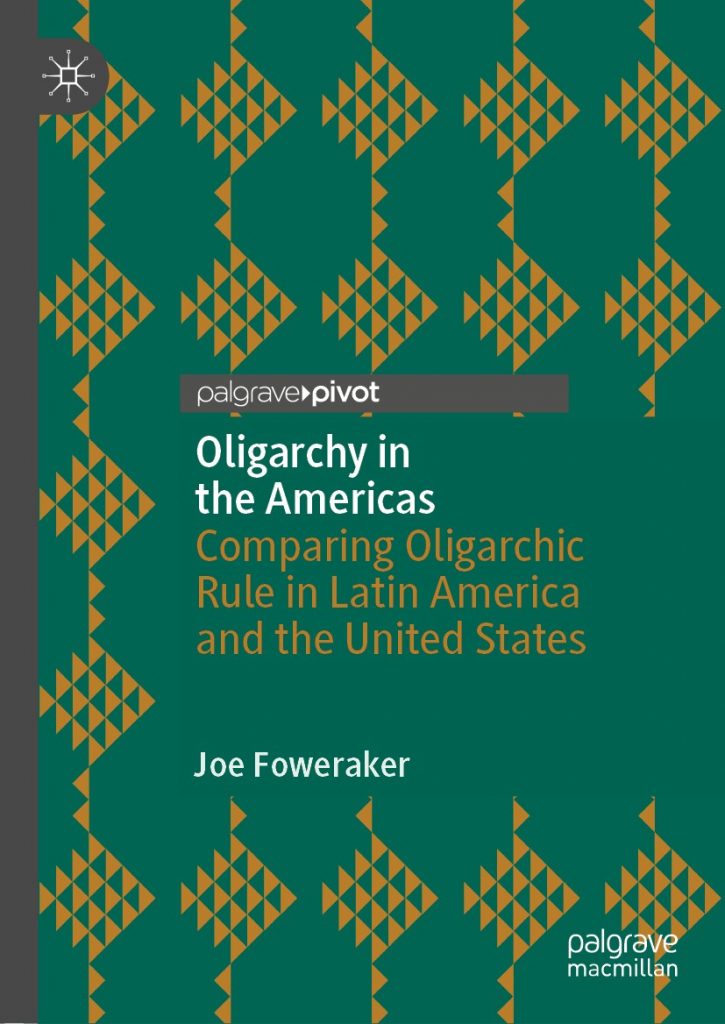Fulbright Chronicles, Volume 1, Number 4 (2023)
Author
Louis E. Esparza

Oligarchy in the Americas: Comparing Oligarchic Rule in Latin America and the United States by Joe Foweraker, Visiting Fulbright Scholar in political science to the University of Colorado at Boulder, 1992-1993
Joe Foweraker’s Oligarchy in the Americas is a sobering and provocative comparison between oligarchic tendencies in the United States and South America. Foweraker, who was the first professor of Latin American Politics at Oxford and Director of the Latin American Center there, provides historical lessons from Argentina and the US. His final chapter synthesizes these into a comparative politics of the Americas.
Foweraker’s argument—that that best form of government is one that can mix democracy with oligarchy—may seem counter-intuitive, but he quotes Aristotle’s The Politics to back this up: “[Aristotle] advocated an admixture of oligarchic and democratic rule—a combination he called polity or politeia” (48). He also cites the twentieth century Austrian political economist Joseph Schumpeter who wrote, “[D]emocracy is ‘simply’ a method for constraining oligarchic ambition and caprice” (102). Yet, as we know from history, when a small group of people take charge, these individuals are usually uninterested in defending the common good.
However, democracy, in Foweraker’s view, also has a tendency to fall into corrupt demagoguery. He notes that Aristotle “defended polity as the best hope of achieving good government in conditions of inequality, which is simply that form of government that can promote the good life” but also warned, “Democracy was potentially dangerous because of its tendency to descend into demagoguery, while oligarchic rule was corrupt in the same degree that it was exclusionary and therefore incapable of securing the good of the community overall by defending the res publica (111).
Foweraker uses the Jim Crow era of America’s history as an example of some of the worst that democracy can produce. Alabamans elected and re-elected Governor George C. Wallace several times. Wallace launched Alabama’s community college system and attracted jobs to the state, but Wallace was also a segregationist with ties to the Ku Klux Klan and a nostalgic admiration for the Confederacy. For Foweraker, Wallace is an example of democracy falling into corrupt demagoguery.
Turning to Argentina, Foweraker does not distinguish between populism and cults of personality of the kind seen there. Juan Perón and Evita were Argentina’s iconic mid-century President and First Lady. Perón increased wages, granted women’s suffrage, provided universal health care, and created social security. “Peronism” is a unique form of Argentine working-class nationalism and has become a regular feature of Argentine electoral politics. But Perón also censored political enemies, extolled Italian Fascism, and antagonized intellectuals. Foweraker calls this “corruption” and argues that it “leads to the balkanization of the state” (41). In Foweraker’s reading, Perónists joined with social movements and mercantilists to oust the rural elite. Falling prey to inflation and debt, Perónists preferred corruption to associating with ranchers.
Foweraker then dispenses with both Jim Crow and Peronism in equal measure and examines today’s oligarchs. He argues they are particularly sclerotic which makes them a greater threat to democracy than anything coming from social movements. He also notes that oligarchs are no longer rooted in community and republicanism, citing Christopher Lasch’s posthumous The Revolt of the Elites and the Betrayal of Democracy where he argues that oligarchy now is “global, heartless and without national identity. In [Lasch’s] view, the phenomenon of the ‘circulation of elites…strengthens the likelihood that elites will exercise power irresponsibly, precisely because they recognize so few obligations to the predecessors and the community.(114)’”.
While Foweraker laments that elites have abandoned their morals, we should remember that nineteenth and twentieth century elites were not particularly moral either. William Henry Vanderbilt, Andrew Carnegie, John D. Rockefeller, and Henry Ford, with $85 billion between them (in current dollars), were as responsible for indigenous displacement and militia violence as they were for their philanthropy. Similarly, Argentine’s ranchers helped expand state control into indigenous areas as much as they lifted the country’s economy to parity with European countries.
Despite these important points, Foweraker’s argument still stands. Compared to today’s elites, Victorian elites may seem like champions of the public sphere. Consider that Elon Musk alone is worth $219 billion and benefits from a now-robust national security state. Even Mexico’s Carlos Slim is worth about as much today as Vanderbilt, Carnegie, Rockefeller, and Ford combined while donating a small fraction in comparison to them.
Compared to today’s elites, Victorian elites . . . seem like champions of the public sphere.
Considering how today’s rising political and economic international tensions are focusing on important, foundational questions surrounding oligarchy, scholars should study the effects and responses to rootless oligarchs through a Fowerakerian lens. The countries of the Americas have important cultural, historical, colonial, and social differences, and we should not rely on the distribution of goods to explain all particular outcomes, but neither are all observed distinctions consequential to the analysis of political outcomes.
Oligarchy in the Americas provides some of the pieces necessary for making these distinctions and accomplishes this while also drawing enlightening conclusions with a unique comparison between Argentina and the US. Whether and how political exclusion works has been and will continue to be the source of great contention. Case studies like this make a good read and track the path dependent elements of the exclusions to come.
Joe Foweraker, Oligarchy in the Americas: Comparing Oligarchic Rule in Latin America and the United States. London: Palgrave Macmillan, 2021.139 pages. $48.
Biography

Louis E. Esparza is Professor of Sociology at California State University-Los Angeles and Fulbright Distinguished Scholar at the University of Brasília (UnB). His research has appeared in Global Labor Journal, Contemporary Justice Review, Society & Natural Resources, Contexts, Partecipazione e Conflitto, and elsewhere. He is co-author of Human Rights: A Primer (Routledge 2016) and co-editor of Human Rights Of, By, and For the People (Routledge 2017). Along with his Sociology of Human Rights class at UnB, he is exploring political expression during the 2022 Brazilian Presidential election. His 2022 Fulbright project in Brazil is titled “Human Rights and Civil Society.” His email is louis.esparza@calstatela.edu
